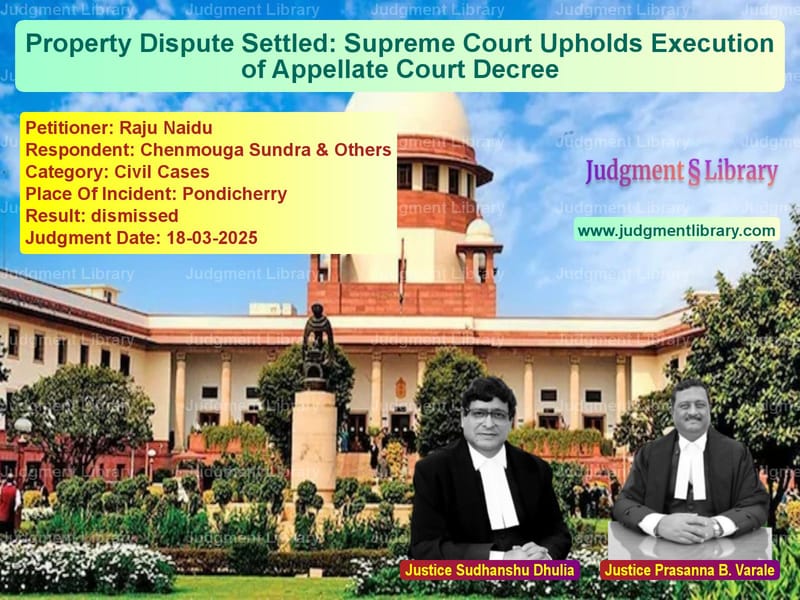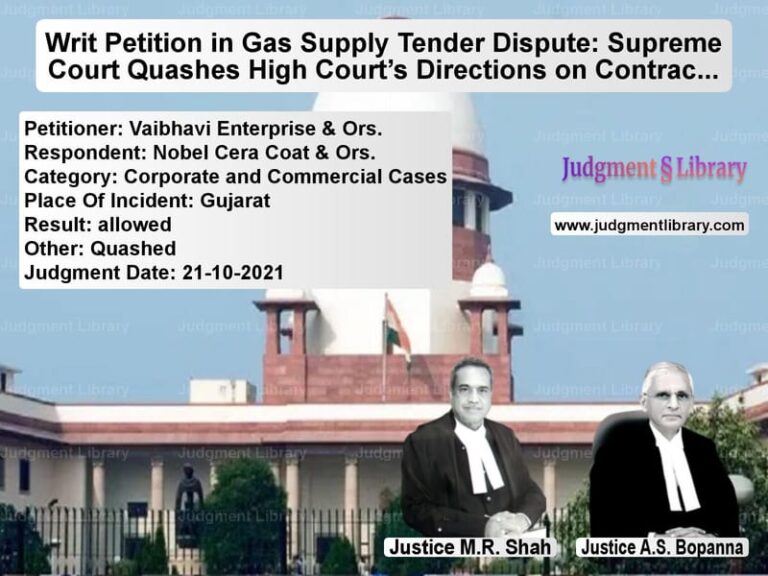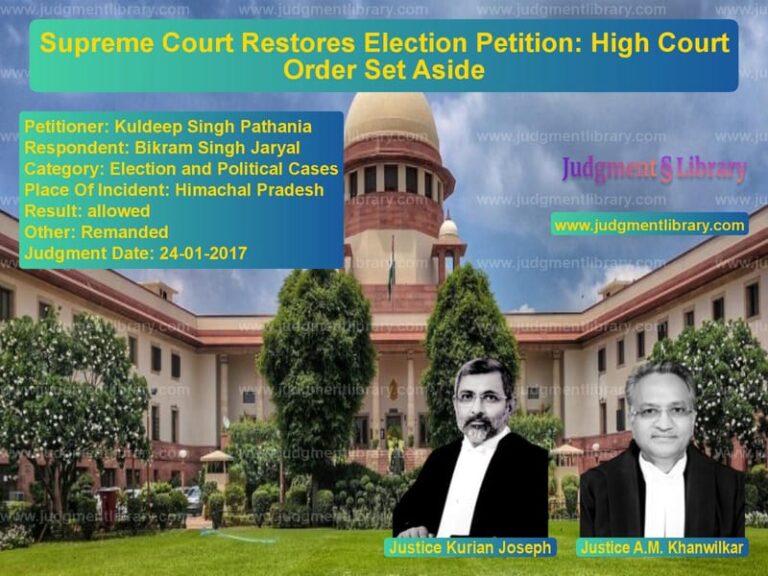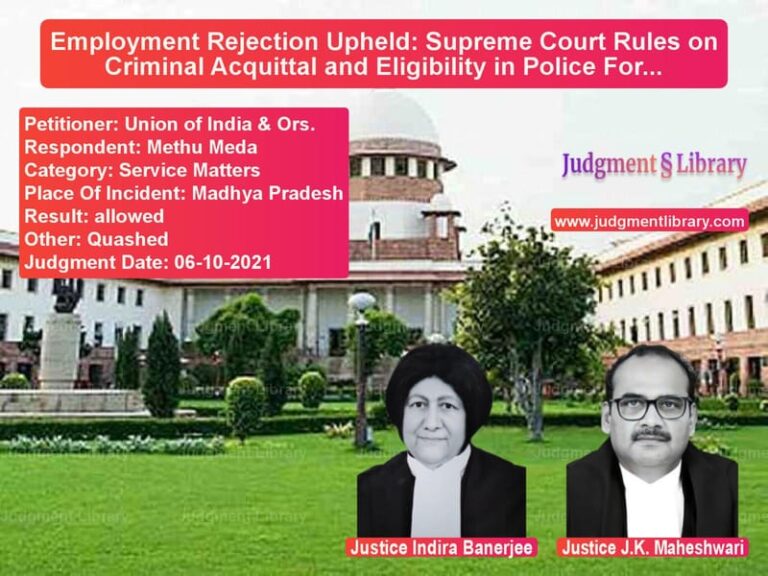Property Dispute Settled: Supreme Court Upholds Execution of Appellate Court Decree
In a significant ruling, the Supreme Court of India settled a long-standing property dispute in the case of Raju Naidu vs. Chenmouga Sundra & Others. The Court upheld the execution of an appellate court decree, dismissing objections raised by the appellant and reinforcing the principle that once an appellate court modifies a decree, the doctrine of ‘merger’ applies, making the appellate court’s decree the final enforceable decision.
The case revolved around the ownership and possession of two properties, referred to as ‘A’ Schedule and ‘B’ Schedule properties, located in Pondicherry. The dispute had its origins in a legal battle spanning over four decades, involving multiple judgments from the trial court, the appellate court, and eventually, the Supreme Court.
Background of the Case
The dispute originated in 1959 when one Chenmougam Aroumugam purchased half of the ‘A’ Schedule property in Mariamman Kovil Street, Thiruvalluvar Nagar, Pondicherry. The other half was acquired by his wife, Tiranti Tam, later that year. Upon her death in 1976, the couple’s children (Respondents 1 to 8) became the legal heirs.
In 1977, the father, Chenmougam Aroumugam, purchased ‘B’ Schedule property at Chetty Street, Pondicherry, and later executed a will in 1978, favoring Respondent 9, a woman he had developed a close relationship with.
Over the years, disputes arose regarding these properties, leading to multiple legal proceedings:
- In 1980, Respondent 2 filed a suit (O.S. No. 262 of 1980) to prevent his father from alienating the suit properties.
- In 1981, despite the ongoing litigation, the father entered into a sale agreement with the appellant, Raju Naidu, for ‘B’ Schedule property for Rs. 60,000. Naidu took possession after paying Rs. 40,000.
- Following a series of court battles, in 1986, the trial court ruled in favor of Respondents 1 to 8, declaring them the rightful owners and ordering the appellant to vacate ‘B’ Schedule property.
Petitioner’s Arguments (Raju Naidu)
- The execution of the decree was barred by limitation as it was initiated more than 12 years after the original trial court judgment.
- The executing court had no authority to extend the deadline for Respondents 1 to 8 to deposit the refund amount of Rs. 40,000.
- Since the appellant had taken possession of ‘B’ Schedule property in part performance of the sale agreement, Section 53A of the Transfer of Property Act protected his rights.
Respondents’ Arguments (Chenmouga Sundra & Others)
- The appellate court had modified the decree in 1993, and under the doctrine of merger, the 12-year limitation period should be counted from that date.
- The executing court’s extension of the refund deadline did not alter the decree but merely facilitated its implementation.
- Section 53A did not apply because the appellant was aware of the ongoing litigation when he entered into the sale agreement.
Key Observations by the Supreme Court
The Supreme Court analyzed the core issues, particularly whether the execution was barred by limitation and whether the executing court had exceeded its authority. The Court ruled:
“Once the decree is modified by the Appellate Court, the doctrine of ‘merger’ comes into effect and therefore, the question of executing the decree immediately would not arise.”
“Even otherwise, irrespective of whether there was modification or not, once the decree and judgment are passed by the Appellate Court, the decree of the Trial Court merges with the same.”
The Court rejected the appellant’s argument that the execution petition was time-barred, stating that the limitation period should be calculated from the appellate court’s decision in 1993, not the trial court’s decision in 1986.
Most Important Verbatim Arguments from the Judgment
“The doctrine of merger does not make a distinction between an order of reversal, modification, or an order of confirmation passed by the appellate authority. The said doctrine postulates that there cannot be more than one operative decree governing the same subject matter at a given point of time.”
“When an appellate court passes a decree, the decree of the trial court merges with the decree of the appellate court and even if, and subject to any modification that may be made in the appellate decree, the decree of the appellate court supersedes the decree of the trial court.”
“Limited rights of the transferee pendent lite on the principle of lis pendens cannot be stretched to obstruct and resist the full claim of the decree holders to execute the decree in their favor.”
Final Judgment and Conclusion
- The Supreme Court upheld the execution of the appellate court’s decree and dismissed the appellant’s objections.
- The executing court’s extension of time for refund deposit was deemed valid and did not alter the decree.
- Section 53A of the Transfer of Property Act did not protect the appellant, as he had entered into the sale agreement with full knowledge of ongoing litigation.
- The doctrine of merger was applied, making the appellate court’s judgment the final enforceable decree.
This ruling serves as a precedent on the application of the doctrine of merger in execution proceedings and reinforces that litigants must adhere to court-mandated timelines.
Petitioner Name: Raju Naidu.Respondent Name: Chenmouga Sundra & Others.Judgment By: Justice Sudhanshu Dhulia, Justice Prasanna B. Varale.Place Of Incident: Pondicherry.Judgment Date: 18-03-2025.
Don’t miss out on the full details! Download the complete judgment in PDF format below and gain valuable insights instantly!
Download Judgment: raju-naidu-vs-chenmouga-sundra-&-o-supreme-court-of-india-judgment-dated-18-03-2025.pdf
Directly Download Judgment: Directly download this Judgment
See all petitions in Property Disputes
See all petitions in Contract Disputes
See all petitions in Specific Performance
See all petitions in Judgment by Sudhanshu Dhulia
See all petitions in Judgment by Prasanna Bhalachandra Varale
See all petitions in dismissed
See all petitions in supreme court of India judgments March 2025
See all petitions in 2025 judgments
See all posts in Civil Cases Category
See all allowed petitions in Civil Cases Category
See all Dismissed petitions in Civil Cases Category
See all partially allowed petitions in Civil Cases Category







